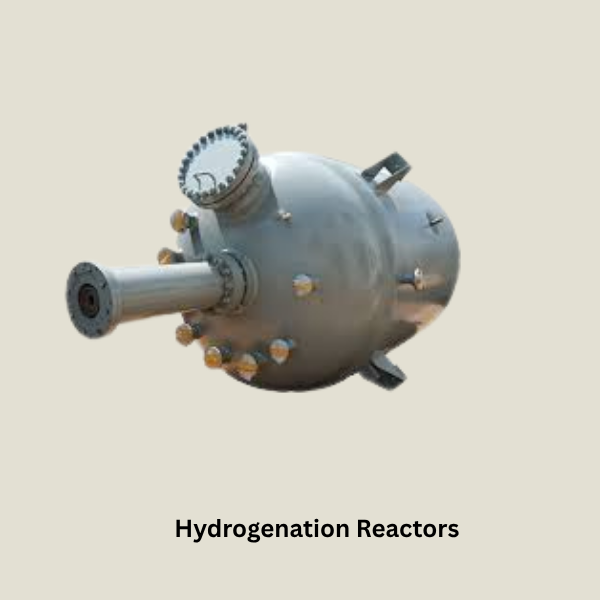Hydrogenation Reactors

Hydrogenation reactors are highly specialized pressure vessels designed to carry out hydrogenation processes—chemical reactions where hydrogen molecules are added to unsaturated organic compounds in the presence of a catalyst. These reactors are a critical component in numerous industries including pharmaceuticals, petrochemicals, agrochemicals, food processing, and specialty chemicals manufacturing.
Hydrogenation involves the transformation of alkenes, alkynes, aromatic rings, or carbonyl-containing compounds into their saturated or partially saturated counterparts. This transformation enhances the chemical stability, shelf life, or usability of the final product. Due to the highly reactive nature of hydrogen gas and the elevated pressures and temperatures required, hydrogenation reactors are built to meet rigorous design standards, incorporating robust materials and advanced safety features.
Typically constructed from high-grade stainless steel (such as SS316 or SS304) or exotic alloys like Hastelloy or Inconel, these reactors offer excellent resistance to corrosion and high-pressure environments. They are engineered to handle operating pressures ranging from 10 bar to over 200 bar and temperatures up to 300°C or more, depending on the process requirements. The interior surface is often polished or coated to ensure high purity and avoid contamination, especially in pharmaceutical and food-grade applications.
Material of Construction (MOC): SS 316 / SS 316L / Hastelloy / Carbon Steel (depending on process).
Capacity Range: 50 Liters to 50,000 Liters.
Design Pressure: Full vacuum to 50 bar (or higher on request).
Design Temperature: -20°C to +250°C.
Agitator Types: High-speed turbine, anchor, or pitched blade with mechanical seal.
Heating/Cooling System: Jacket, limpet coil, or internal coils for precise thermal control.
Hydrogen Gas Handling: Designed with gas spargers for efficient dispersion.
Safety Features: Pressure relief valves, rupture discs, gas detection system, and flameproof electrical fittings.
Compliance: ASME, GMP, DIN, and other international safety standards.
A Hydrogenation Reactor facilitates the chemical reaction between hydrogen gas and organic/inorganic compounds in the presence of a catalyst. The reactor is built to withstand high pressure and temperature, ensuring uniform mixing of reactants, proper heat transfer, and controlled reaction rates. Depending on process needs, these reactors can be designed for batch or continuous operations, ensuring maximum yield and product quality.
- Pharmaceutical manufacturing of vitamins, intermediates, and APIs.
- Hydrogenation of oils, fats, resins, and specialty chemicals in the chemical industry.
- Petrochemicals include catalyst reactions, fuel upgrading, and refinement processes.
- Production of margarine and the hydrogenation of edible oils for the food industry.
- Safeguards hydrogen handling under pressure.
- Ensures uniform reaction conditions for high efficiency in conversion.
- Design that can be changed to work with both batch and continuous hydrogenation processes.
- High durability with corrosion and pressure resistance.
- Low-maintenance and energy-efficient operation.
Conclusion
Hydrogenation Reactors from Harsha Engineers are built with precision engineering, robust safety systems, and superior material quality. They offer industries a reliable solution for achieving consistent, efficient, and safe hydrogenation results, helping improve productivity and maintain product quality.
